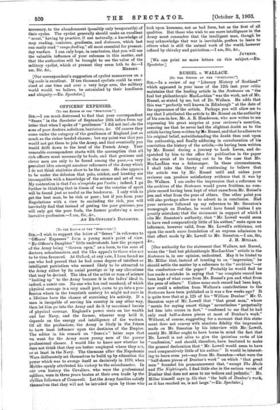RUSSEL v. WALLACE.
[TO THE EDITOR OP 1115 " SPECTATOR:1
Sen,----In a review , of my "Literary History of Scotland" which appeared in your issue of the 12th inst. your critic maintains that the leading article in the Scotsman on "the foul but philanthropic MacLachlan" was the work, not of Mr. Russel, as stated by me, but of Dr. Wallace. He adds that this was "perfectly well known in Edinburgh " at the date of the appearance of the article. Perhaps you will allow me-to say that I attributed the article to Mr. Russel on the authority of his son-in-law, Mr. A. E. Henderson, who now writes to me expressing his great surprise at your reviewer's assertion, assuring me that he never had the slightest doubt as to the article having been written by Mr. Russel, and that he adheres to his original belief, notwithstanding the doubt thus cast upon the authorship, and finally adducing in corroboration of his conviction the history of the article,—its having been written by Mr. Russel during a journey to Loch Leven, and de- spatched by him to the office for publicadon in the paper in the event of its turning out to be the case that Mr. MacLactlan was a fishmonger. In these circumstances, I shall take the liberty of continuing to believe that the article was by Mr. Russel until and unless your reviewer can produce satisfactory evidence that . it was by Dr. Wallace. I am under the impression 'that a reference to the archives of the Scotsman would prove fruitless, no com- plete record having been kept of what came from Mr. Russel's Pen and what from the pens of others. One other point ypu will also perhaps allow me to advert to in conclusion. " Had your reviewer followed up my reference to Mr. Smeaton's monograph on Dunbar, he ,would have found (unless I am greatly mistaken) that the statement in support of which I cite Mr. Smeaton's authority, that "Mr. Lowell would seem to have read comparatively little of his author," rests upon no inference, however valid, from Mr. Lowell's criticisms; out upon the much surer foundation of an express admission to that effect made by Mr. Lowell to Mr. Smeaton.—I am, Sir,
J. H. Mnieto.
[Our authority for the statement that Wallace, not Russel, wrote the "foul but philanthropic MacLachlan" article in the Scotsman is, in our opinion, undoubted. May it be hinted to Mr. Millar that, instead of trusting to an "impression," he should settle the matter by a reference to the "archives "—or the conductors—of the paper? Probably he would find he has made a mistake in saying that "no complete record has been kept of what came from Mr. Russel's pen and what from the pens of others." Unless some such record had been kept, how could a selection from Wallace's contributions to the Scotsman have been Published as it was n few weeks ago ? It is quite true that at p. 125 of his "William Dunbar" Mr. 0. Smeaton says of Mr. Lowell that "that great man," whose "mania for saying smart things" nevertheless "perpetually led him into errors in fact," "confessed to me thathe had only read half-a-dozen pieces at most of Dunbar's work." Without, of course, suggesting for a moment that this state- ment does not convey with absolute fidelity , the impression made on Mr. Smeaton by his interview with !dr.:Uwe% surely Mr. Millar ought to have borne in mind the fact that Mr. Lowell is not alive to give the ipsissima verba of his "confession," and should, therefore, have hesitated to make the general declaration that "Mr. Lowell would seem behave read comparatively little of his author." It would be interest- ing to learn even yet—say from Mr. Smeaton—what were the "half-dozen pieces of Dunbar's work" on which "that great man" founded his pronouncement that, "except The Merle and The Nightingale, I find little else in the serious verses of Dunbar that does not seem to me tedious and pedantie.",. Mr. Millar himself says (p. 55) that "the bulk of Dm:Janes work, as it has reached us, is not large."—Eo. Spectator.]


























































 Previous page
Previous page